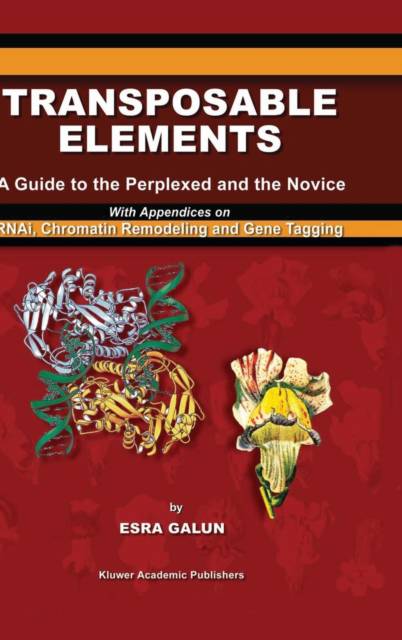
Bedankt voor het vertrouwen het afgelopen jaar! Om jou te bedanken bieden we GRATIS verzending (in België) aan op alles gedurende de hele maand januari.
- Afhalen na 1 uur in een winkel met voorraad
- In januari gratis thuislevering in België
- Ruim aanbod met 7 miljoen producten
Bedankt voor het vertrouwen het afgelopen jaar! Om jou te bedanken bieden we GRATIS verzending (in België) aan op alles gedurende de hele maand januari.
- Afhalen na 1 uur in een winkel met voorraad
- In januari gratis thuislevering in België
- Ruim aanbod met 7 miljoen producten
Zoeken
Transposable Elements
A Guide to the Perplexed and the Novice with Appendices on Rnai, Chromatin Remodeling and Gene Tagging
Esra Galun
Hardcover | Engels
€ 209,95
+ 419 punten
Omschrijving
OY (])PONEOYLI TOIA YTA IIOAAOI OKOEOJII Many fail to grasp what they have seen, and cannot judge what they have learned, ErKYPEOYLI OYL1E MA(R)ONTEE ITINOEKOYIT although they tell themselves they know. EQYTOJII L1E L10KEOYLI Heraclitus of Ephesus, 500 BC " ... everyone that is not speckled and C T v: N;, 'T, ji, N, tuN '= spotted among the goats and brown among the sheep, that shall be counted N N, n =, c w=== c, m stolen with me." Genesis Chapter 30 From Heraclitus of Ephesus and later philosophers, we can deduce that observation of natural phenomena, even when keen and accurate, will not result in meaningful knowledge unless combined with analysis of the mind; just as analysis of the mind without acquaintance with natural phenomena will not suffice to grasp the perceivable world. Only familiarity with phenomena combined with mental analysis will lead to additional knowledge. The citation from Genesis, Chapter 30, is part of an unusual story. It tells how Jacob received, as payment for his service to Laban, the bulk of Laban's herds. By agreement, Jacob was to receive "only" the newborn speckled and spotted goats and the newborn brown sheep that differed completely from their parents. Did Jacob know that there was instability (transposable elements?) in the pigmentation of Laban's herd? It is reasonable to assume that Jacob combined his keen observation with analysis of his mind in order to predict the outcome: most of the newborns were indeed speckled, spotted or brown.
Specificaties
Betrokkenen
- Auteur(s):
- Uitgeverij:
Inhoud
- Aantal bladzijden:
- 335
- Taal:
- Engels
Eigenschappen
- Productcode (EAN):
- 9781402014581
- Verschijningsdatum:
- 31/07/2003
- Uitvoering:
- Hardcover
- Formaat:
- Genaaid
- Afmetingen:
- 179 mm x 233 mm
- Gewicht:
- 766 g

Alleen bij Standaard Boekhandel
+ 419 punten op je klantenkaart van Standaard Boekhandel
Beoordelingen
We publiceren alleen reviews die voldoen aan de voorwaarden voor reviews. Bekijk onze voorwaarden voor reviews.









